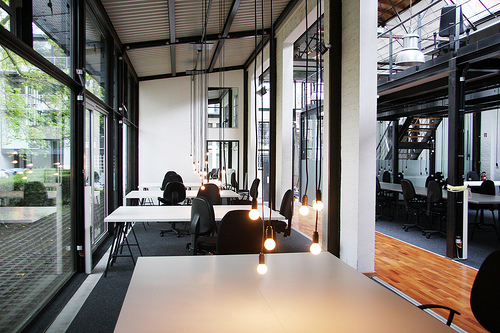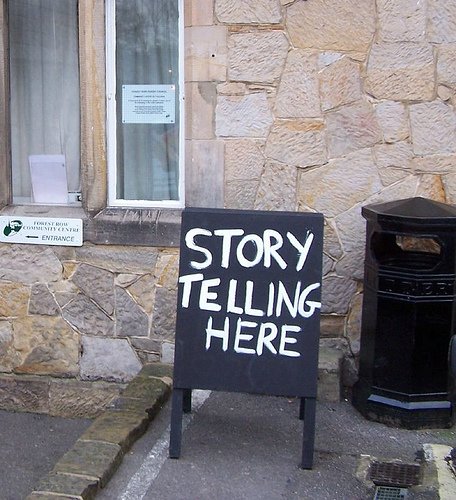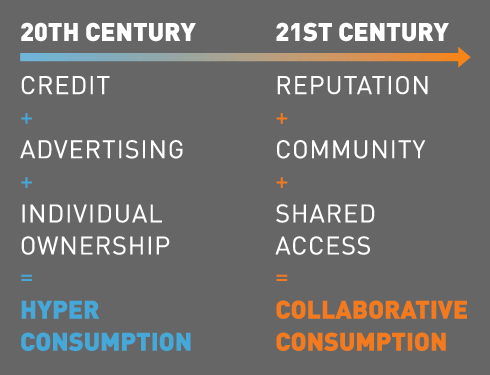Coworking has been gathering momentum in the past year or two. As more and more coworking locations are established, more people learn what it is, there is more exposure, then more people learn about it. That snowball effect is at its very early stages, but, in a year or two the awareness of coworking will increase exponentially.
It’s 2010, Folks
Where does a person work when they are not commuting to a centrally located office that took 2 hours to get to…..in traffic?
Well….they can work at home, at a cafe, at the airport, in a hotel, in an executive office, virtual office, or at a coworking location. Anywhere, anytime, anyone.
The mobile workforce has arrived! Well, it CAN arrive.
For those small businesses, freelancers, independents (and the rare commuter) what are some options for “office space”? Lets take a quick look at the differences between two of the options: a virtual office and coworking.
Really Quickly
A Virtual Office is a traditional office environment; the only difference being a virtual office is shared and limited. But it follows the traditional way of thinking for an “office”: Secretary/Receptionist, phone, desk, file cabinets, 10 x 10 office with a door.
Coworking is a new way to work in a shared community. Work in an open space, use private rooms for meetings or phone calls, use your own cell phone, and do your own work…all of it. In most cases your entire work life is your laptop or other mobile device.
Please keep this in mind as you read the following. This just a guideline, places vary in what they offer, so the appropriate changes may be to be taken into account:
Receptionist:
- Virtual Office: yes
- Coworking: no (who needs their cell phone answered for them?)
Telephone Service:
- Virtual Office: yes
- Coworking: probably not (cell phones, Google Voice)
Fax:
- Virtual Office: yes
- Coworking: many do, some don’t (old fashioned anyway…get with the future!)
Private Office with a desk:
- Virtual Office: yes
- Coworking: some yes, some no
High class fancy digs:
- Virtual Office: probably (a great place to show off your wealth and status)
- Coworking: many, but they tend to stress casual-functionality.
Conference Room:
- Virtual Office: yes (mostly for extra cost)
- Coworking: most (mostly free with membership)
Access to Office:
- Virtual Office: limited number of days / month
- Coworking: unlimited and/or limited membership options per month
Community:
- Virtual Office: no (close your door and work by yourself)
- Coworking: yes (collaborate, do things together, birthday parties, help with problems….evening gatherings, meetings, seminars, classes…..!)
Free WiFi:
- Virtual Office: probably not
- Coworking: yes (it is ingrained in the coworking culture)
Free Coffee:
- Virtual Office: probably not
- Coworking: yes (again this is ingrained in the coworking culture)
Month by Month rentals:
- Virtual Office: probably not, but, some are moving towards this
- Coworking: probably yes, but other options available
Monthly Cost Example (valid as of Nov 17, 2010):
Most Office Hours:
Virtual Office in California (from the web site): 40 hours in office, with all the phones, mail, receptionist, etc:
$135 set up, $275 per month (12 months committed), $325 per month (3 months committed)
Nearby Coworking Space: Unlimited time in office (24×7), you answer your own cell phone, printer/scanner, free coffee, free WiFi, free IT support, conference rooms are free, mail:
$189 per month, month by month, no set up fees.
Least Office Hours:
Virtual Office: 10 hours per month in office, $135 set up, $160 per month (12 month commit), $200 per month (3 month commit)
Coworking Space: 16 hours per month in office, $49 per month, no set up fees.
Membership:
- Virtual Office: no (it’s an office, business, you rent, period)
- Coworking: yes (it’s a community of like minded people working, collaborating, and having fun, it’s from the heart)
Summary
Some people may need the features offered by a Virtual Office while some may fit better in a Coworking location.
A possible general rule: If you work at a cafe to get out of the house…you will like coworking. If you are a high powered future executive needing to impress…a virtual office is for you!





 After three years being open,
After three years being open, 